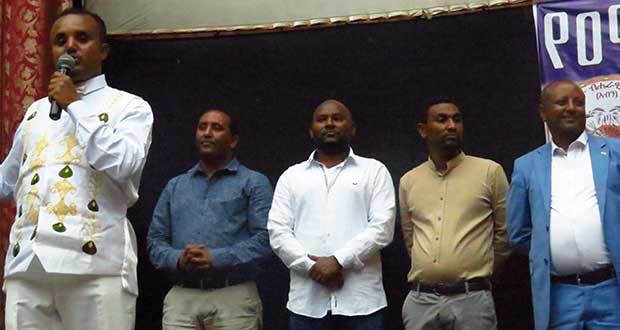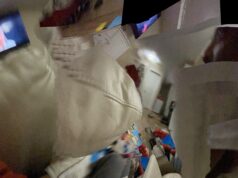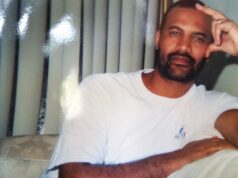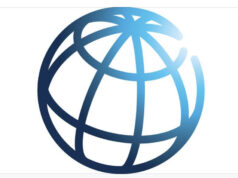National Movement of Amhara (NaMA) party.
At 37, Dessalegn Chanie Dagnew (Ph.D.) is the President of the newly founded National Movement of Amhara (NaMA) party. Currently, he is working as an Assistant Professor of Hydrology & Water Resource Management at Bahir Dar University (BDU) and is the Vice Director of the Institute of Disaster Risk Management and Food Security Studies of BDU. He has received his PhD from a joint PhD program of the School of Civil and Water Resources Engineering of BDU and Cornell University, a Master’s degree from Cornell University, NY, USA (Integrated Water Resource Management), Bachelor of Arts Degree in Economics (BDU) and Bachelor of Education in History minoring Geography (BDU). Addis Standard interviewed Dessalegn on the establishment of NaMA, the debate surrounding its establishment, its challenges and opportunities. Excerpts:
————————–
Addis Standard (AS): Tell us how much you have prepared to establish NaMA and why you thought it was important?
Over the past 6 months, we have made enough preparations to establish the National Movement of Amhara (NaMA). Preparation of the party program, rules and regulations, framing our goals, ideological and strategic issues, organizational structure, party discipline and related guidelines, [among others]. Moreover, recruiting over 1500 founding members from five regions, pre-congress consultations, [and] preparations for the founding congress were also held before the deliberations of the founding congress. All these required us a lot of preparation, time, effort and resources.
The realization of NaMA is a great breakthrough and an important step in the struggle of the Amhara people for equality, socio-economic and political justice and above all the respect of God given rights of the Amhara people: the right to its basic existence and dignity. The establishment of NaMA is important because the Amhara people have been eagerly waiting for a genuine Amhara party; a party that truly represents the aspirations, interests, rights and its national interests. NaMA is expected to be a guardian of the fully fledged Amhara Nationalism and the “Amhara Questions”. Our party will strive to stay up to the expectations of the Amhara people.
AS: But there is a mixed reaction to the establishment of NaMA. Some reactions have dismissed it and others have supported it. Why do you think are people divided about it?
Right, there is a mixed reaction from friends and foe. Our people received the news of the birth of NaMA with great enthusiasm, excitement and hope. There is so much cheers and applause by the Amhara youth, scholars, elites, businessmen, the Amhara diaspora and every section of our society, for this historic development. This is not due to the strength of our party, but because our people felt that it has been left without a genuine political representation. On the other hand, there are two distinct groups that either vehemently dismissed NaMA or raised some sort of concerns over an ethnic based party of Amhara.
Those who dismissed NaMA have gone up to labeling our party as a militant group and a danger to the constitutional order and the federation. These people are the detractors of Amhara Nationalism and have proved themselves as adversaries of our people; they never shy away from opposing and belittling anything that is of Amhara. Most of them have a general hate and Anti-Amhara sentiments; their judgement and smear campaigns are derived by the fear and hate they have to the Amhara ethnic group. Alas, most of them are either members or sympathizers of a narrow ethno-nationalist party, which are purely anti-Amhara. These groups were behind the continued war of words and propaganda attack that has been launched against the people of Amhara over the years.
Some people, however, firmly believe that ethno-nationalist parties are not a solution to Ethiopia’s multi-faceted political problems. This group raise concerns for NaMA because most of them consider our move as a retreat from Ethiopianism and Ethiopian values. They think that Amhara nationalism is a treat to a national unity. Truth be told, Amhara Nationalism has and will never be a treat to Ethiopia and the unity of our beloved country. Unlike some other nationalist movements that set out a defined enemy from the beginning (Amhara people), Amhara nationalism and NaMA has no people labeled as an enemy. The enemy of our people are political views, institutions, parties and individuals who have been busy, over the past decades, spreading hate and hate crimes against the innocent people of Amhara. Such groups have committed unspeakable horror and crimes against our people. As they do not want to see the Amhara stand up against all sorts of injustice and discrimination, they out rightly dismissed our movement. They are afraid of the repercussions from their past crimes. However, the quest of our people has been not revenge but an end to their animosity.
Dessalegn Chanie Dagnew (Ph.D.) is the President of the newly founded National Movement of Amhara (NaMA) party.
AS: In your risk assessment, how do you see the impacts of these negative responses on your day to day activity as a newly formed political party?
From the very beginning, we expected such responses and reactions. As every risk has its own opportunities, we consider these negative responses as reminder to be more careful and focused, to deny our adversaries a pretext for their blames, blatant allegations and name-calling. This as an opportunity to strengthen ourselves and focus on the greater cause and the goal of our struggle; reversing the existential threat that the Amhara has faced. Their outrage and lies are just a noises and cannot stop or distract us from our destiny.
AS: Staying in that course, some of the criticisms came from people who hold a significant support for the proper representation of the Amhara people within the Ethiopian body politic. Does this present you or any of the senior leadership within NaMA with some sort of dilemma? How do you plan to address that?
I do not agree with your assertion that some of the people who hold a significant support for the proper representation of the Amhara are our critics. If there are such instances, we hope that they are rare and cannot create damage to our movement. However, whoever criticizes, we will critically examine the criticism and comments forwarded and look for something constructive to improve our organization. However, these criticisms cannot present a dilemma to any of the senior leadership of NaMA. Be it our friends or foe, we are open to any constructive criticisms and suggestion. We will also work with any group or individuals interested in Amhara causes. We do not have a luxury and time for division and dialogue over the courses and approaches of the Amhara struggle. We would rather be forward looking, search for common grounds, and collaborate with anyone that is Amhara and stand for the national advancement of the Amhara people.
AS: One of the reasons that you raised while discussing the need to establish NaMA during your acceptance speech in Bahir Dar was the lack of proper representation and political marginalization of the Amhara people, because of, to paraphrase your own argument, a repressive narrative that the Amhara people are wrongly portrayed as oppressive ruling class. How exactly do you plan to address that through the establishment of NaMA given that it is a war of the narrative?
The narrative that wrongly portrayed the Amhara as an oppressor ruling class has been done through a systematic and designed manner, over the past 27+ years. The chief architect of this dubious allegation is the Tigrean People’s Liberation Front (TPLF). This narrative was latter institutionalized with the ratification of the constitution of the FDRE. The constitution in the preamble and in some of its articles reaffirms this same narrative, and made the accusation “constitutional”. We plan to address this through our struggle such as counteracting the widely circulated propaganda through all media outlets, party briefs, awareness creation and indoctrination. More importantly, we will urge the government of Prime Minister Abiy Ahmed Ali to make constitutional amendments and corrective actions such as an open apology for the people of Amhara.
AS: Will your party be supporting some Ethiopians who do not agree with the current constitution and are calling for it to be replaced?
We support the idea that the constitution needs either substantial amendment or replacement by a more progressive one. However, failure to fully implement and respect the constitution, which is the supreme law of the land, was one of the limiting factors for the democratization of Ethiopia. TPLF and its subordinates have been above the law and the constitution.
AS: Do you think what gave a push for the establishment of your party is, as some people say, the growing trend of Amhara nationalism?
The Amhara people have been fighting dictators and repressive regimes from the very beginning and have paid immense prices, in [the] fight for a democratic Ethiopia. In the past 27 years, our people have been resisting TPLF’s ethnic domination such as the annexation of its fertile and historic territories, forceful displacement and social engineering, mass imprisonment and killing, inhumane treatment, socio-economic and political marginalization. This resistance against the TPLF [dominated] EPRDF regime got momentum with the revival of Amhara nationalism over the past three years. The Wolqaite Amhara Question and Col. Demeke Zewdu’s heroic self-defense has served as the engine of Amhara Nationalism.
Our people are sick and tired of this repressive regime and are openly confronting and ululating for the inevitable change. We all can agree that Amhara nationalism has now reached at its height and needs a vanguard party at home. This party is expected to lead the struggle of our people in to victory. Moreover, since the passing of the late professor, our martyr professor Asrat Woldeyes – the Chairman of All Amhara Peoples Organization (AAPO), the Amhara people were without a genuine political party. Thus, our party is an attempt to fill this gap, but can also be viewed as a child of the Amhara nationalism/Amhara resistance.
AS: Then what is your party’s view of the concept of “nationalism” itself given the current political dispensation in the country?
During the transitional government and the formation of the FDRE, the Amhara people were not represented. Their interests and aspirations were not included, which created the alienation and sense of exclusion from the federation. Thus, Amhara nationalism is basically an endeavor to reverse these past mistakes and try to bring the interests of our people on to the negotiating table. By doing so, the people of Amhara can engage in disciplined bargaining, with other nations and nationalities of Ethiopia and try to protect its interests. By doing so, the Amhara nationalism will protect the interest of the Amhara and at the same time end the long lasting marginalization of Amhara. This in turn is in the interest of Ethiopia’s stability, security and national unity; a genuine federation based on respect of one another. In this matter, nationalism can be viewed as a tactical move to organize our people, and try to abide by the rules of the game. It’s a means to our threatened existence and protection of our interests.
AS: How do you see the role of your party vis a vis that of the Amhara National Democratic Movement (ANDM), which is part of the ruling EPRDF, in terms of advancing the cause of the Amhara people? Is that one of complimentary or competitive? Along with that, do you think NaMA will be ready to take part in the next general elections?
The role of NaMA will definitely be safeguarding the Amhara people in every way. In that respect, our role Vis a VisANDM will definitely be both complimentary and competitive. It will be competitive if ANDM is committed to working for the Amhara people, unlike the bad old days when the party was serving as a surrogate for TPLF. In principle, we would love to work with any one, which truly represents Amhara interests. However, competition is also an inevitable phenomena. The change within the ANDM is so sluggish that it’s unlikely to meet the expectations of the growing political demands of our people. In that case, NaMA will definitely compete and chase away ANDM from power and make our people the owner of sovereign authority.
In principle, we will take part in the upcoming 2012. However, the final decision to participate will be based on detail assessment of the reforms to the electoral board, the justice system, media and political landscape of the country, which we shall see it in due course.
AS: What would you like to sat to those Ethiopians who sympathize with the plight of the Amhara people and yet express reservations about the formation of NaMA on the basis that it is an ethnic centered political party?
Our message to our Ethiopian brothers and sisters, to the Ethiopian people and friends of the Amhara people who sympathize with the plight of the Amhara is loud and clear. The move to establish NaMA is not to destabilize Ethiopia or distance ourselves from Ethiopians. Rather, it is a tactical move to end the political advantage that has been taken from the Amhara by ethnic minorities. Everyone was taking advantage of our tactical fault to stand as a pro-unity at the expense of our Amhara identity. This [our new] tactical move will definitely unite the Amhara, protect itself from any eminent existential danger. Gradually, a strong Amhara will contribute to the Ethiopian project, which should be viewed as the project of every Ethiopian, not the sole business of the Amhara, as it was wrongly portrayed by our adversaries.
AS: Finally, tell us about the Ethiopia you would like to see in the near future and the role of your party?
I would like to see Ethiopia free from TPLF/EPRDF repressive regime, where the mass incarceration, torture, widespread killing, forced displacement, socio-economic marginalization of Amhara and other Ethiopians is over once and for all. Also I would like to see an Ethiopia where Amhara is treated as a brother, not as an oppressor by our fellow citizens.
(Sourse- Addis Standard)

























